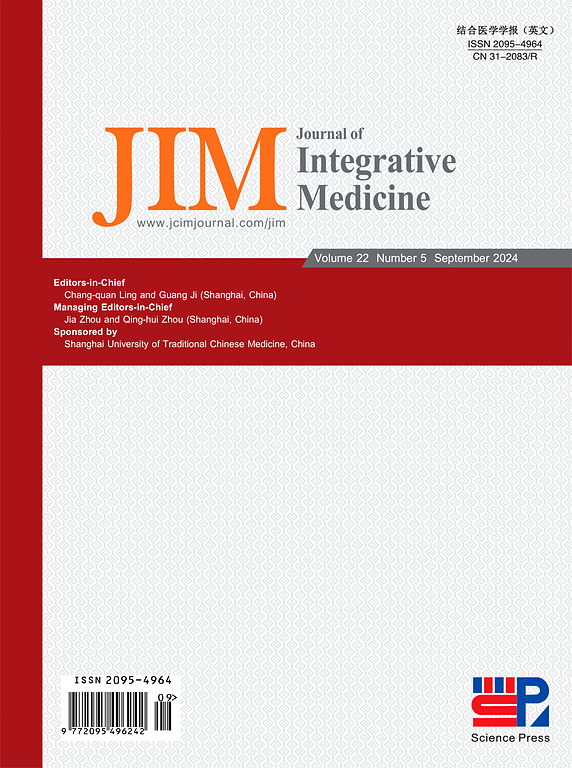2021年至2022年间发表的口服中草药系统评价的方法学质量:一项横断面研究
IF 4
2区 医学
Q1 INTEGRATIVE & COMPLEMENTARY MEDICINE
引用次数: 0
摘要
目的:本横断面研究评估了在2021年1月至2022年9月间发表的中文中草药系统评价(SRs)的方法学质量。方法:通过3个国际数据库和4个国内数据库的文献检索,对汉文中药特定剂进行鉴定。使用测量工具评估系统评价2对方法学质量进行评价。使用逻辑回归来探讨书目特征与质量之间的关系。结果:方法质量分析发现,在213份抽样的SRs中,69.5%为极低质量,30.5%为低质量,没有一个达到高质量或中等质量。常见的缺点包括未能确定被排除在分析之外的研究,未能披露资金来源,以及对偏见对结论的潜在影响的评估有限。Logistic回归分析显示,隶属于大学或学术机构的通讯作者撰写的论文质量往往低于隶属于医院或临床机构的通讯作者撰写的论文质量。结论:近期的中文CHM SRs显示出有限的方法学质量,使其不太可能支持临床实践指南的发展。需要采取紧急行动,加强对参与编写和出版社会报告的研究人员、同行审稿人和编辑的培训。在中文期刊的系统评价和荟萃分析报告指南中采用首选报告项目对于提高SRs与中医药发展的相关性至关重要。解决方法和报告方面的缺陷对于促进中医循证实践和知情临床决策至关重要。蒋勇,钟国伟,王宝宝,徐顺生,何福荣,邝明辉,何磊,周建生,林建奎,刘金平,钟伟昌,张宝成。2021 - 2022年发表的口服中药系统评价的方法学质量:横断面研究。集成医学[J];打印前Epub。本文章由计算机程序翻译,如有差异,请以英文原文为准。
Methodological quality of systematic reviews on orally administered Chinese herbal medicine published in Chinese between 2021 and 2022: A cross-sectional study
Objective
This cross-sectional study assessed the methodological quality of systematic reviews (SRs) of Chinese herbal medicine (CHM) published in Chinese between Jan 2021 and Sep 2022.
Methods
Chinese language CHM SRs were identified through literature searches across 3 international and 4 Chinese databases. Methodological quality was appraised using A MeaSurement Tool to Assess systematic Reviews 2. Logistic regressions were used to explore associations between bibliographical characteristics and quality.
Results
Analyses of methodological quality found that among the 213 sampled SRs, 69.5% were of critically low quality, 30.5% were of low quality, and none achieved high or moderate quality. Common shortcomings included the failure to identify the studies excluded from the analysis, failure to disclose funding sources, and limited evaluation of the potential impact of bias on conclusions. Logistic regressions revealed that SRs led by corresponding authors affiliated with universities or academic institutions tended to be of lower quality than SRs led by authors affiliated with hospitals or clinical facilities.
Conclusion
Recent Chinese language CHM SRs exhibited limited methodological quality, making them unlikely to support the development of clinical practice guidelines. Urgent initiatives are needed to enhance training for researchers, peer-reviewers and editors involved in the preparation and publication of SRs. Adoption of Preferred Reporting Items for Systematic Reviews and Meta-Analyses reporting guidelines in Chinese language journals is crucial to improve the relevance of SRs for Chinese medicine development. Addressing deficiencies in methodology and reporting is essential for promoting evidence-based practices and informed clinical decisions in Chinese medicine.
Please cite this article as: Jiang Y, Zhong CC, Wang BH, Xu SS, Ho FF, Kwong MH, Ho L, Zhou JHS, Lam KC, Liu JP, Zhang BT, Chung VCH. Methodological quality of systematic reviews on orally administered Chinese herbal medicine published in Chinese between 2021 and 2022: A cross-sectional study. J Integr Med. 2025; 23(5):492–501.
求助全文
通过发布文献求助,成功后即可免费获取论文全文。
去求助
来源期刊

Journal of Integrative Medicine-Jim
Medicine-Complementary and Alternative Medicine
CiteScore
9.20
自引率
4.20%
发文量
3319
期刊介绍:
The predecessor of JIM is the Journal of Chinese Integrative Medicine (Zhong Xi Yi Jie He Xue Bao). With this new, English-language publication, we are committed to make JIM an international platform for publishing high-quality papers on complementary and alternative medicine (CAM) and an open forum in which the different professions and international scholarly communities can exchange views, share research and their clinical experience, discuss CAM education, and confer about issues and problems in our various disciplines and in CAM as a whole in order to promote integrative medicine.
JIM is indexed/abstracted in: MEDLINE/PubMed, ScienceDirect, Emerging Sources Citation Index (ESCI), Scopus, Embase, Chemical Abstracts (CA), CAB Abstracts, EBSCO, WPRIM, JST China, Chinese Science Citation Database (CSCD), and China National Knowledge Infrastructure (CNKI).
JIM Editorial Office uses ThomsonReuters ScholarOne Manuscripts as submitting and review system (submission link: http://mc03.manuscriptcentral.com/jcim-en).
JIM is published bimonthly. Manuscripts submitted to JIM should be written in English. Article types include but are not limited to randomized controlled and pragmatic trials, translational and patient-centered effectiveness outcome studies, case series and reports, clinical trial protocols, preclinical and basic science studies, systematic reviews and meta-analyses, papers on methodology and CAM history or education, conference proceedings, editorials, commentaries, short communications, book reviews, and letters to the editor.
Our purpose is to publish a prestigious international journal for studies in integrative medicine. To achieve this aim, we seek to publish high-quality papers on any aspects of integrative medicine, such as acupuncture and traditional Chinese medicine, Ayurveda medicine, herbal medicine, homeopathy, nutrition, chiropractic, mind-body medicine, taichi, qigong, meditation, and any other modalities of CAM; our commitment to international scope ensures that research and progress from all regions of the world are widely covered. These ensure that articles published in JIM have the maximum exposure to the international scholarly community.
JIM can help its authors let their papers reach the widest possible range of readers, and let all those who share an interest in their research field be concerned with their study.
 求助内容:
求助内容: 应助结果提醒方式:
应助结果提醒方式:


